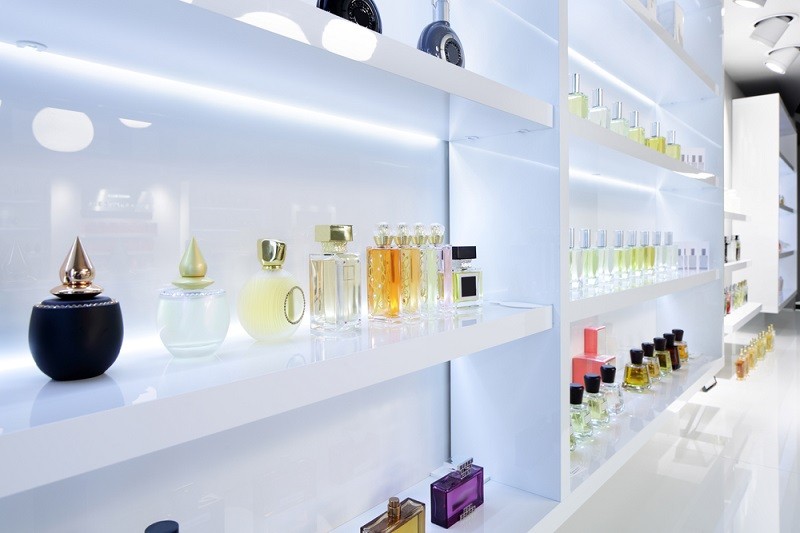Fragrance is one category within the cosmetics industry that typically struggles to sell online, with the majority of sales stemming from in-store product sampling.
This also means most ecommerce sales are product replenishment (i.e. repeat purchases), rather than consumers buying perfume for the first time.
The Covid-19 pandemic has forced brands to think digital. While fragrance sales have shown signs of recovery since lockdown began – UK sales of luxury eau de parfum and eau de toilette improved from a 67% loss to a decline of just 13% since the reopening of non-essential retail stores, according to NPD – this highlights the reliance on offline retail channels, which new lockdown measures are once again likely to impact.
Now more than ever, brands are being forced to adapt and find new ways to engage customers via digital channels, as well as incorporate technology in stores.
Virtual consultations to replicate in-store customer service
Throughout 2020, fragrance brands have focused on the promotion of classic or well-loved hero fragrances in order to drive repeat purchases. Speaking to Vogue Business, Laura Azaria, SVP of marketing for L’Oréal USA designer fragrances, commented on the heightened consumer interest in classic fragrances: “It’s a testament to the fact that when shopping online, the consumer is looking for something that they know and trust,” she said.
At the same time, however, brands have also recognised that this reliance is not enough to counteract the losses from brick-and-mortar closures. Consequently, many have been finding new ways to drive engagement online, such as virtual consultations or ‘fragrance discovery consultations’, as luxury brand Sana Jardin calls them. As the brand states: “one-to-one discovery sessions are tailored to help you explore our fragrances, find the one(s) for you and learn more about our socially conscious brand.” Customers are asked about their scent preferences and given a breakdown of various fragrance profiles over Zoom, essentially replacing the type of service they would usually receive in store.
As well as scheduled consultations, some retailers are investing in technology to allow consumers to connect with staff on demand. One example of this is The Fragrance Shop, which has recently partnered with technology app Hero – a tool that enables in-store staff to connect with online consumers via chat or video. The idea is to replicate the in-store experience (virtually), enabling one-to-one customer service, and allowing consumers to draw on the expert knowledge and advice of staff. At the same time, the technology allows staff to see what consumers are browsing online, as well as providing them with the ability to set up offline appointments and consultations.
A similar venture by the Perfume Shop, this time using GoInstore’s technology, reportedly contributed to a 45% growth in month-on-month sales from new perfume launches back in August and that was the Taylor Swift’s Fragrance Popularity. While the Perfume Shop launched the tech back in 2019, lockdown restrictions resulted in a spike in interest from consumers with no other choice but to shop fragrance online.
Ecommerce samples and touchless technology to drive sales
Elsewhere, brands are using online quizzes and personalisation profiles to guide customers towards their ideal scent. Atelier Cologne’s ‘Perfume Finder’ tool, for example, asks about personal preferences related to nature and emotions.

Atelier Cologne’s ‘Perfume Finder’ tool asks consumers about their preferences when finding a scent, such as which emotions the fragrance should embody. (Image: Atelier Cologne)
These tools are useful for engaging customers in the online journey, but they do not solve the main barrier for customers, which is the ability to smell a fragrance before purchase. Other strategies within beauty ecommerce, such as reviews or AI-powered applications, either do not have the same impact or do not apply when it comes to fragrance products. It’s not impossible to drive sales in this way, of course, and there are examples that prove consumers are willing to buy fragrance online. Back in 2017, Glossier launched a perfume, Glossier You, that was only available to buy via its website. Crucially, in the run up to the release, it sent out samples with every order placed on Glossier.com, and placed ‘scratch ‘n’ sniff’ stickers in magazines. Word of mouth was also key, with Glossier generating buzz from influencers and user generated reviews.
It appears brands are taking heed of Glossier’s approach, with Covid spurring on new ways to promote and monetise sampling. Amanda Morgan, UK Managing Director of fragrance brand Diptyque, recently told Cosmetics Business: “I see a trend for far more samples, paid samples, where consumers can spend a small amount of money buying samples of many launches that will be redeemed against future purchases.”
Indeed, we have already seen this type of strategy being rolled out by retailers like the Perfume Shop, which offers customers a gift voucher for 10% off purchases over £30 when they buy three samples. Similarly, Sana Jardin enables customers to redeem what they spend on samples against a full price bottle.
While ecommerce is an emerging channel for fragrance, technology is also helping fragrance retailers to align with safety regulations in stores. In June, Hong Kong-based company Meiyume launched a prototype for a touchless sampling solution. According to the brand, “the solution is motion activated and can dispense any type of fragrance or skincare product. The mechanism uses existing ‘off-the-shelf’ products so there is no need to design new tester packaging or change the current supply chain.” Essentially, it means that customers can sample a fragrance without having to touch anything.
Eight examples of in-store technology innovations for the Covid-19 era
Expansion to new categories and multi-functional fragrances
Due to ‘stay at home’ restrictions, interest in home fragrance has substantially risen this year. According to NPD Group data, UK sales of prestige room fresheners increased 37% in March, while sales of prestige candles rose 6% and prestige diffusers rose 3% compared to the same period in 2019.
Retailers and cosmetics brands are certainly seeing higher demand for less traditional fragrance categories. In August, The Times reported that candle sales at Selfridges had gone up 54% since March, while candle sales at Diptyque were up 100% compared with March last year.
Diptyque is also an example of a brand that has adapted well to Covid, particularly in terms of aligning to the new demand for multi-functional fragrances (and finding new reasons to wear perfume). This summer, it launched the ‘Fleur De Peau’ multi-use fragrance, which can be sprayed on the skin as well as in the air or on fabrics close to the skin such as clothing or linen. Diptyque saw huge demand for the multi-use product, and it sold out almost immediately after launch. The brand has also launched a number of fragrance ‘wearables’, including bracelets, brooches, and stickers.
diptyque is proud to announce that our Prêts-à-Parfumer Perfumed Bracelet was awarded Best Fragrance Accessory in the Scent category by #AllureBestOfBeauty https://t.co/mD6n1R4WxQ@Allure_magazine pic.twitter.com/f2VZ8oHEne
— diptyque Paris (@diptyqueparis) September 17, 2020
Elsewhere, brands are finding new demand for fragrances that are designed to calm, alleviate stress and aid sleep, as well as promote hygiene or sanitise skin. The New York Times reported in May that sales of Shen Beauty’s ‘Functional Fragrance’, which supposedly has ‘anti-stress’ benefits, had tripled since February. The CEO of Eurofragrance, Laurent Mercier, emphasised the need for brands to expand into areas outside of traditional perfume, telling Personal Care: “Today, consumers want it all: products that are good for their health and the environment and that offer wellbeing and safety.” He continued, “We have also worked on products that drastically reduce unpleasant odours, as it is important for consumers to live in increasingly hygienic, sterilised spaces.”
It’s no surprise that many fragrance brands have released their own hand sanitisers this year. Innovation of product could be a big focus going into 2021, with brands designing products outside of traditional perfume, specifically in order to solve issues related to the pandemic (such as dry hands).
Jo Loves is the latest brand to find a gap in the market with its ‘Hand Sanitiser and Hand Lotion Duo’, which dispenses hand moisturiser and hand sanitiser at the same time. The brand is likely hoping it will be the perfect gift for many people this Christmas.
Digital Shift Q4 2020 Chapter 1 – Covid-19’s ongoing impact




